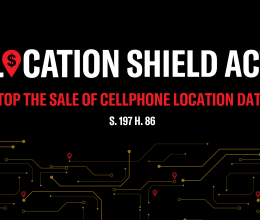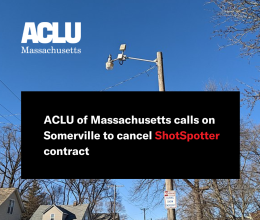
The ACLU of Massachusetts, together with Ropes & Gray, today filed a lawsuit against the Massachusetts Department of Transportation (MassDOT) seeking information about how the agency uses and shares its state driver’s license database for face surveillance purposes.
MassDOT makes its Registry of Motor Vehicles (RMV) database available to local, state, and federal law enforcement agencies for face surveillance purposes. The database contains the photographs of every person who has applied for a state-issued ID—millions of people. Since 2006, MassDOT has made this database available for face recognition searches without any regulations. According to the new ACLU lawsuit, public accountability for face surveillance technology is critical given both its potential impact and the depth of its flaws.
“When you go to get a driver’s license, no one tells you that you’re also entering your face into a surveillance dragnet,” said Carol Rose, executive director of the ACLU of Massachusetts. “People expect to be able to go about our lives without every move being tracked by the government. But face surveillance technology gives the government unprecedented power to track who we are, where we go, what we do, and who we know. Massachusetts must ensure face surveillance technology doesn’t get out ahead of our basic rights.”
The ACLU filed a public records request under the Massachusetts public records law in February 2019, seeking communications and policies about MassDOT’s use of face surveillance technology. The ACLU filed a second public records request in April 2019, seeking information about the sharing of and access to the Massachusetts RMV database. MassDOT has not responded to either request. According to the new lawsuit, responsive documents are the only means of understanding how this technology and its use have affected the civil rights and civil liberties of Massachusetts residents.
“There’s a lot we don’t presently know about how government agencies like the RMV use face surveillance in Massachusetts,” said Kade Crockford, director of the Technology for Liberty Program at the ACLU of Massachusetts. “But here’s what we do know: This technology poses grave threats to our civil rights and civil liberties by reinforcing gender and racial biases, and has the potential to eradicate privacy and anonymity in public spaces including schools, parks, and our neighborhood streets. Despite these grave threats, it is entirely unregulated in Massachusetts today. It’s time to press pause in Massachusetts, and pass a moratorium on government use of the technology.”
“We are at a critical juncture where the development of technology is outpacing government regulation of it,” said Robert Skinner, litigation and enforcement partner at Ropes & Gray. “State agencies in Massachusetts have been left to self-regulate their use of face surveillance, but citizens have a right to know how this technology is used and will be used in the future.”
The ACLU of Massachusetts recently launched “Press Pause on Face Surveillance,” a new campaign to build awareness about the civil liberties concerns posed by face surveillance technology and the need to pass a statewide moratorium on the government’s use of the technology. An ACLU poll shows 79 percent of voters support a moratorium on government use of face surveillance technology, which is currently unregulated in Massachusetts. An ACLU-backed bill currently before Massachusetts legislators on Beacon Hill would establish a statewide moratorium on government use of face surveillance and other biometric screening technologies until the legislature imposes checks and balances to protect the public’s interest.
Last month, the Somerville City Council unanimously voted to pass an ordinance banning city government use of face surveillance technology. Somerville is now the first community on the East Coast to prohibit government use of face recognition surveillance technology, joining a growing nationwide movement to bring the technology under democratic control.







